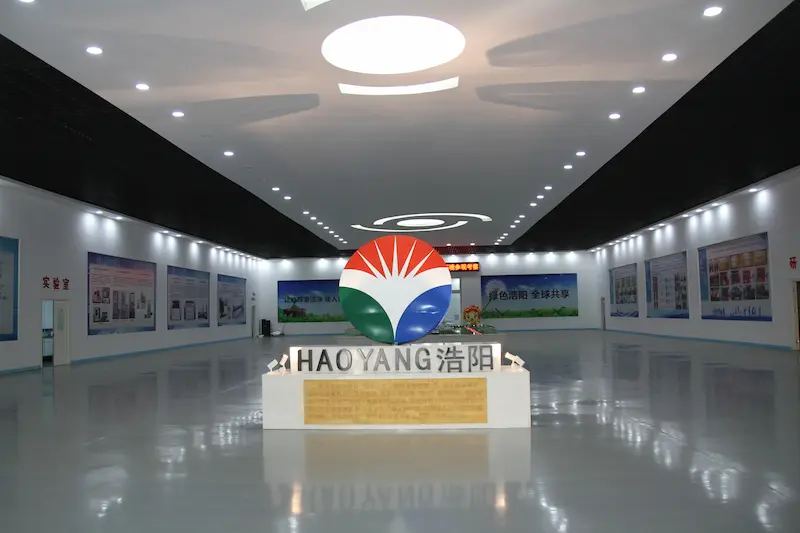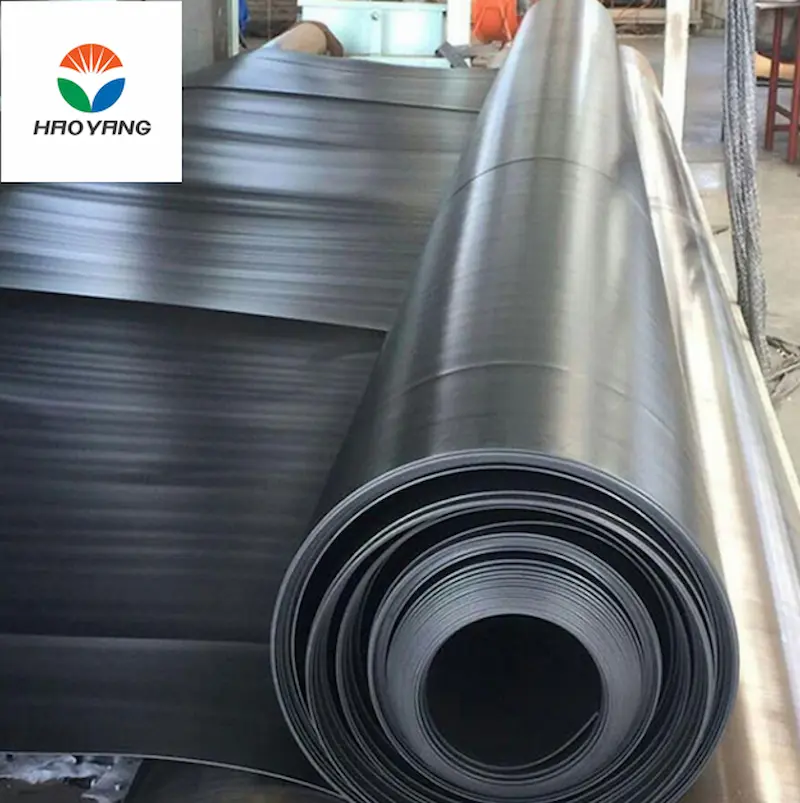l Definition
HDPE geomembrane, the full name of high-density polyethylene geomembrane, is a waterproof barrier material made of more than 97% polyethylene resin and 2%-3% carbon black ratio. It is made of high polymer processing, the density is usually 0.96g/cm³ or above, with environmental stress cracking resistance, low temperature resistance, anti-aging, corrosion resistance and other properties, and is widely used in various engineering fields that need seepage prevention and isolation.

l HDPE geomembrane price
Thickness | Price(USD/m2) | MOQ(m2) |
0.3mm | 0.39 - 2.89 | 1000 |
0.5mm | 0.15 - 1.89 | 1000 |
0.75mm | 0.35 - 0.40 | 3000 |
1mm | 0.39 - 3.89 | 1000 |
1.5mm | 0.39 - 3.89 | 1000 |
2mm | 0.10 - 3.07 | 1000 |
l HDPE geomembrane for applicaton
1. Landfill: HDPE geomembrane is used in a large number of landfill projects in Malaysia, such as laying at the bottom of the landfill and slope as an anti-seepage lining to prevent landfill leachate leakage and pollution of groundwater and soil, and is also used to cover the system, accelerate the decomposition of garbage while preventing odor diffusion, rain into, etc., effectively control pollution.
2. Hydraulic engineering: In the construction of reservoir, HDPE geomembrane is used for seepage prevention of dam and reservoir area to improve the safety and stability of the dam; In the channel engineering, it can prevent the leakage of the canal and improve the utilization efficiency of water resources. It can also be used in dam works to prevent leakage and flood erosion.
3. Mining field: In mining engineering in Malaysia, HDPE geomemofilm is used for anti-seepage treatment of tailings ponds, preventing harmful substances in tailings from leaking into soil and groundwater, and protecting the surrounding environment.
4. Aquaculture: In aquaculture ponds, laying HDPE geomemofilm can prevent water leakage, facilitate the maintenance and management of the pond, and help control water quality, reduce the risk of disease transmission, and improve the efficiency of aquaculture.
5. Other fields: It is also used in sewage treatment facilities, agricultural irrigation reservoirs, pond bottom lining of golf courses, etc., to play a role of seepage prevention and isolation.
l HDPE geomembrane application case
1. Landfill project: A landfill used a total of 111,000 square meters of HDPE geomembrane. The anti-seepage system at the bottom of the reservoir is laid from the bottom up with a 30cm thick pebble groundwater diversion layer, 200g/m² filament geotextile, 30cm thick clay layer, 4800G/m² bentonite mat, 2mm thick HDPE film, 600g/m² filament geotextile, 2cm thick medium coarse sand layer, 200g/m² Filament geotextile, 30cm thick pebble leachate diversion layer.
2. Sewage treatment project: A sewage treatment plant in Malaysia uses 2mm thick HDPE geomembrane as the anti-seepage lining of the sewage tank, effectively preventing the pollution of the surrounding soil and groundwater by sewage leakage.
l Advantages of geomembrane in landfills
Advantage | Concrete advantage |
Impermeability | Effectively prevent landfill leachate from entering the soil and groundwater, and prevent external water from entering the landfill. |
Chemical stability | It has strong corrosion resistance and can resist the erosion of various chemicals in the landfill leachate. |
Physical properties | High mechanical strength, strong puncture resistance, good aging resistance, in Malaysia climate conditions, anti-UV, delay aging, prolong service life. |
Isolation and closure | After covering, it blocks the diffusion of garbage odor gas, prevents flies and bacteria from contacting the garbage, and prevents the garbage from being blown by the wind or spread due to surface runoff. |
Construction | Light weight, easy to carry, reduce the construction labor intensity and difficulty
|
Landfill efficiency is improved | Make the landfill operation more convenient and efficient, provide favorable conditions for waste compression, improve the utilization rate of landfill space, extend the service life |
Environmental protection and sustainability | Some geomembranes can be recycled and reused, which meets the requirements of green environmental protection and promotes sustainable development |
l Challenges and Countermeasures
1. Environmental challenge
High temperature and humidity: Malaysia's climate is hot and humid, high temperature will accelerate the aging of geomembrane, and high humidity environment may lead to microbial breeding and erosion of geomembrane. In response, the geomembrane with anti-aging and anti-microbial additives can be selected, the exposure time of the geomembrane can be shortened as much as possible during construction, and the protection should be covered in time after completion.
2. Geological challenge
Complex terrain: Some parts of Malaysia have complex terrain, and it is difficult to lay geomembrane in areas such as mountains or hills, which is prone to problems such as uneven laying, excessive stretching or damage. In this regard, detailed geological survey should be carried out before construction, and special construction plans should be formulated according to the terrain, such as sectional laying and anchoring technology in places with large slopes; For areas prone to settlement, a certain amount of geomembrane expansion should be reserved.
3. Construction process challenge
Construction technology and personnel quality: geomembrane construction requires professional technology and experience, if the construction personnel are not skilled, it is easy to lead to problems such as unstable welding and non-standard laying. It is necessary to strengthen the training of construction personnel, improve their professional skills and operation level, and arrange professional supervision and guidance during construction, and operate in strict accordance with construction norms.
4. Operation and maintenance challenge
Leachate corrosion: the composition of landfill leachate is complex and contains a variety of corrosive substances, and long-term contact will damage the geomembrane. A protective layer can be added to the surface of the geomemofilm, such as geotextile, etc., and the composition and concentration of the leachate can be monitored regularly in order to take timely countermeasures.
5. Accidental damage:
During the operation of the landfill, geomembrane may be accidentally damaged due to landfill operations and animal activities. Regular geomembrane inspection system should be established to repair damage in time; In the landfill operation, standardize the operation process to avoid large machinery directly
l Future development
HDPE geomembrane has a promising future in Malaysia's landfills. As waste generation increases and environmental requirements increase, its demand will continue to rise. Technically, performance will be continuously optimized and integrated with intelligent monitoring. In terms of application, in addition to anti-seepage, the application in the field of sealing coverage and ecological restoration will be expanded, and it will be more used with other materials. In terms of policy, the government's support and the improvement of relevant norms will provide a strong guarantee for its development, promote the HDPE geomembrane to play a greater role in the construction and operation of landfill sites in Malaysia, and help the environmental protection and sustainable development of the waste treatment industry.

897.webp)
942.webp)
237.webp)